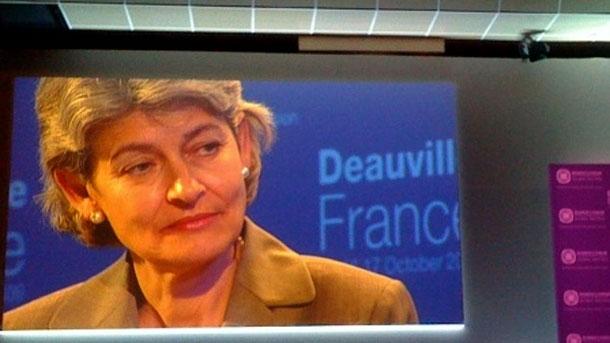
UNESCO’s newly-elected Director General, Bulgarian Ms Irina Bokova says she’s very keen on recapturing UNESCO’s original designation as a “laboratory of ideas” within the United Nations.
The first UNESCO lady Director General will assume office on 15 November 2009. 64 years complete on that date from the start of the daring post-WW2 move to pull together the global cultural and scientific potential in an attempt ”to build peace in the minds of the people” as it is there that wars have always originated. Nowadays, in the newly-emerging multi-polar world, this objective is still very much valid for UNESCO, though it needs to be re-defined to meet most recent challenges. According to Ms Bokova, mankind must set on a course to a new world of peace and humanism, just societies, societies of knowledge and new technologies, harnessed to serve the interests of mankind and be environment friendly. The policy of dialogue between cultures, respect for and preservation of cultural and language diversity, freedom of speech and access to information are some of the tools for attaining equilibrium in the global world. Ms Irina Bikova is pleased that her salient message for dialogue, mutual respect and tolerance has been well received in UNESCO. Dialogue and unity will evidently stand high on her agenda which also includes making UNESCO an organization with wider doors open to accommodate all” bright minds” across the world; she also plan to set up” Wise men’s Councils”, comprising outstanding experts, Nobel Prize laureates and thinkers of our time.
The new UNESCO Director General vows to take further the reforms initiated by her predecessor Koichiro Matsuura and aiming to optimize the administration, de-centralization of activities, transparency and efficiency of the organization.
She’s pledged also continuity of UNESCO’s salient priorities. Education has always been the first and foremost priority - nearly a billion people worldwide, two thirds of them women, have no access to education. A great number of them live in Africa - the continent to which the world organization will continue to channel the greatest amount of resources and efforts. Gender equality will be another red-light area meriting special attention. “While women across the world do not enjoy equal access to education, information and government positions, we cannot speak of achieved gender equality”, Ms Bokova asserts. She would also like science to assume its due place in the broad UNESCO spectrum of activities as much as the environment issue. The perpetuation of the world cultural and natural heritage will continue to be the organization’s trademark with an accent on the treasure house of mankind’s non-material heritage.
English version: Margarita Dikanarova
Back home again after 30 years! This is exactly what is happening to the oldest Bulgarian folk ensemble in North America. Affiliated with the Bulgarian-Macedonian National, Educational, and Cultural Center (BMNECC) in Pittsburgh, Pennsylvania, the Otets..
The official opening of the 2025 Harvest Campaign will take place at 10am in the "Agro – Tsar Petrov" farm in the Vidin region. BTA reports that the host of the event is Victor Rombaut. Rombaut is an agricultural producer in the Vidin area, originally..
Bulgaria is constantly changing, say the founders of the Bulgaria Wants You initiative. For the past five years, they have been holding motivational meetings and discussions with Bulgarians living abroad, showing them a different side to their homeland..
On June 21 the world will have a reason to unite and humble itself. We can find it in the International Day of Yoga – the ancient..

+359 2 9336 661
